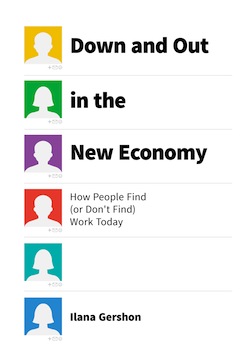Prof. Ilana Gershon’s latest book is Down and Out in the New Economy. (photo from Ilana Gershon)
An increasing number of people in their 50s and 60s are needing or wanting to find work – and are finding that next job elusive.
Indiana University anthropology professor Ilana Gershon has been researching the (often unsuccessful) ways in which job seekers look for work. One result of this research is her latest book: Down and Out in the New Economy: How People Find (or Don’t Find) Work Today (University of Chicago Press, 2017).
Long gone are the days that employers just want an extra pair of hands to do a job, said Gershon.
“We used to have an idea of ourselves as workers, in which we imagined we owned ourselves, as if we were property,” she explained. “This was the metaphor – that we were renting ourselves to an employer for a certain period of time and, when the time was over, we’d get ourselves back. The idea of renting ourselves as though we were property really affected the ways you could have particular ideas, of what was a just work relationship.
“So, you thought you could have arguments about whether you should have a 40-hour work week or not, about how much time you should be able to rent yourself to an employer … and people would have legal cases and legislation around the boundaries of work. Should people be paid for putting on a uniform that would make them be work ready or should they put on a uniform in their own time, and should employers only pay for them once they put on the uniform?”
Gershon said this metaphor very much shaped how people thought about what was appropriate and what was not.
“One of the other consequences of that is that unions were able to argue that, in fact, people were not just renting a portion of their day,” she said. “Unions argued that they were renting a portion of their lives and, as a result, the companies owed them health insurance or a pension … that they should be reimbursed for giving over a portion of their lives to the company.”
On the other side of the equation were the companies, which were very interested in ensuring there was some form of company loyalty.
According to Gershon, in the United States and the United Kingdom, after Ronald Reagan and Margaret Thatcher took power, respectively, things began to change. People began to imagine themselves as though they were a business – as a bundle of skills, assets, qualities, experiences and relationships that had to be consciously managed like a business. And, as a business, continual enhancement was required.
“When people are entering into an employment contract, that now means they are entering into a business-to-business contract, in which they are offering temporary solutions for market-specific problems a company experiences,” explained Gershon. “So, now you have all these self-help articles that talk about being the CEO of Me Incorporated.
“One of the other consequences of this is people now talk a lot about having a personal brand. Because, if you imagine yourself as a business, then you should have a personal brand, as businesses have brands. So, a lot of the ways in which people understand what the employment contract can now offer them is being shaped by this change in metaphor.”
 Gershon’s research on the topic began in 2012, with the interviewing of people around Indiana University and her attending one or two job search workshops available to undergrad students. In 2013/2014, while being a fellow at Stanford’s Centre for Advanced Study in the Behavioural Sciences, she did field work in the Bay Area in California.
Gershon’s research on the topic began in 2012, with the interviewing of people around Indiana University and her attending one or two job search workshops available to undergrad students. In 2013/2014, while being a fellow at Stanford’s Centre for Advanced Study in the Behavioural Sciences, she did field work in the Bay Area in California.
Not everything regarding the job market is new, she said. “People already know a lot about hiring, because they participated in hiring in their previous workplaces … and they shouldn’t ignore everything that they already know.
“I was trying very hard not to make it a Silicon Valley project,” she said of her research. “I was very concerned about that, because, what I wanted to do was think about the hiring ritual in general. I interviewed people in the Midwest and East Coast about this – not as many people as I interviewed in the Bay Area, but I wanted to check if I saw any difference.
“The major difference I saw was that the people had a very different idea of how much time you should spend at a job. People in the Bay Area thought the ideal time you spend at a job was two to three years. And, in the Midwest, it was something more like seven to 10. On the East Coast, it was more like five to eight.”
According to Gershon, she worked hard to produce an “anti-advice book.” Her aim was to focus the book on the implications of thinking of yourself as a business and how that has changed hiring and affected what employment contracts have become. Further, she wanted to explore how one should present themselves as an employee, and what employers feel are desirable traits in candidates.
One of Gershon’s findings is that the new concepts are now standard fare in all job search workshops.
“People are being told to do this, but people in the trades and blue collar workers don’t seem to find this way of thinking terribly useful yet,” she said. “So, the people for whom it fits their situation best are going to be white collar workers for the most part.”
But, whether or not everyone finds the ideas useful, they are being encouraged.
“People working retail are constantly being told they have to brand themselves,” said Gershon by way of example. “I don’t think this particular way of trying to brand yourself constantly or imagine yourself as a business is making all that many people happy.
“If you haven’t been in the workforce for 15 to 20 years and you’re suddenly going to these job search places where they’re telling you everything is new and the ways you used to look for jobs no longer make sense … it’s all very confusing. I’m offering the context for that, explaining why things might seem new, and what’s genuinely new and what isn’t.
“I think figuring out how to get a job is actually something you have to do specifically for your particular industry,” she added. “People offer a lot of standardized advice, as though there’s a magic bullet that works in every context. What I’m talking about is how not to engage with that kind of standardized advice. Instead, figure out how to do the research so that you can understand those communities on your own.”
Rebeca Kuropatwa is a Winnipeg freelance writer.

